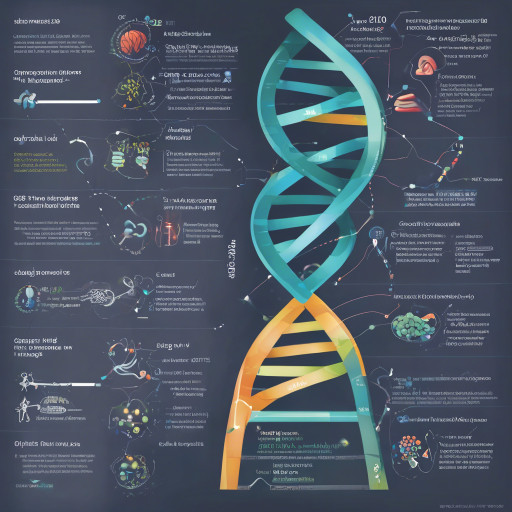
Your Genome as a Health Roadmap: Using DNA Tests to Navigate Potential Challenges
Your Genome as a Health Roadmap: Using DNA Tests to Navigate Potential Challenges
Introduction
Each of us carries within our cells a unique genetic blueprint that influences everything from eye color to disease susceptibility. Advances in DNA testing have transformed that blueprint into actionable insights, offering a roadmap for personalized health planning. By identifying inherited predispositions, individuals can take targeted steps to reduce risks and optimize well-being. Far from being deterministic pronouncements of fate, genetic test results represent probabilities—powerful tools that, when combined with lifestyle choices and medical guidance, enable proactive management of health.
Understanding DNA Testing
DNA tests analyze specific variations in your genome—known as genetic variants—to identify inherited traits and risk factors. Two main categories dominate today’s marketplace: direct-to-consumer (DTC) tests and clinical genetic tests. DTC tests, often sold online, provide insights into ancestry, nutrition, fitness tendencies, and certain health risks. Clinical tests, ordered by healthcare professionals, focus on medically actionable conditions such as hereditary cancers, cardiovascular disorders, and pharmacogenomic responses to drugs. Both types rely on saliva or blood samples to extract DNA, which is then genotyped or sequenced to reveal relevant markers.
Key Health Applications
1. Hereditary Cancer Risks
Mutations in BRCA1, BRCA2, and other tumor-suppressor genes can elevate lifetime risk for breast, ovarian, and prostate cancers. Early identification of these mutations enables intensified screening—MRI, mammography, or prostate exams—alongside risk-reducing strategies such as prophylactic surgery or chemoprevention.
2. Cardiovascular Health
Variants in genes like LDLR, APOE, and PCSK9 affect cholesterol metabolism and plaque formation. People with high-risk profiles can implement dietary changes, statin therapy, or more frequent cardiovascular evaluations to stave off heart disease.
3. Metabolic and Nutritional Insights
Genes involved in lipid processing (e.g., FTO) and glucose metabolism (e.g., TCF7L2) influence the predisposition to obesity and type 2 diabetes. Nutrigenomic reports suggest personalized dietary adjustments—macronutrient ratios or micronutrient supplementation—to optimize metabolic balance and support healthy weight management.
4. Pharmacogenomics
Drug efficacy and adverse reactions often hinge on genetic factors. For instance, variations in CYP2C19 influence how the body metabolizes common medications such as clopidogrel (a blood thinner) or certain antidepressants. Armed with pharmacogenomic data, physicians can tailor drug selection and dosing to minimize side effects and maximize therapeutic benefits.
5. Neurodegenerative Disease Risks
Apolipoprotein E (APOE) genotyping can reveal increased risk for Alzheimer’s disease. While no cure exists, early awareness fosters proactive cognitive health measures: mental stimulation, cardiovascular fitness, and potential enrollment in clinical trials focused on prevention.
Benefits of a Genetic Roadmap
Empowerment through Knowledge
Armed with genetic insights, individuals move from passive to active participants in their health journey. Recognizing elevated risk triggers earlier and more frequent screenings, and inspires lifestyle modifications that can delay or attenuate disease onset.
Personalized Prevention
Preventive medicine shifts from broad population guidelines to tailored recommendations. A person at high risk for osteoporosis might start calcium and vitamin D supplementation sooner or incorporate weight-bearing exercises under professional supervision.
Enhanced Patient–Provider Collaboration
Genetic data fosters deeper, evidence-based conversations between patients and clinicians. Rather than reacting to symptoms as they arise, the healthcare team navigates a joint strategy, adjusting preventive protocols and interventions in real time.
Limitations and Considerations
Probabilistic Nature
Genetic predispositions do not guarantee disease manifestation. They indicate elevated or reduced probabilities, and environmental factors—diet, exercise, stress, exposure—play a decisive role. A high-risk gene variant can be mitigated by healthy behaviors, while a low-risk profile does not confer immunity.
Data Interpretation Challenges
Raw genetic data can be misread without proper context. Variants of unknown significance (VUS) may lack clear guidance, and some commercial reports overstate the predictive power of certain markers. Partnering with qualified genetic counselors or medical geneticists is crucial for accurate interpretation.
Privacy and Ethical Concerns
Genomic data is deeply personal. Safeguarding privacy requires careful review of a testing company’s data-sharing policies and consent options. Understanding who can access, use, or sell genetic information—insurance companies, research institutions—helps maintain control over one’s genomic identity.
Action Steps for Navigating Your Genetic Roadmap
1. Select a Reputable Provider
Research accreditation, clinical validation studies, and third-party reviews. Look for companies that adhere to regulatory standards—CAP (College of American Pathologists) and CLIA (Clinical Laboratory Improvement Amendments) certifications ensure laboratory quality.
2. Seek Professional Guidance
Genetic counselors bridge the gap between raw data and meaningful action plans. They assess family history, weigh risks, and recommend appropriate follow-up tests or medical referrals. Counseling also addresses emotional responses and ethical questions.
3. Integrate Results into a Holistic Plan
Genetic insights should complement—not replace—traditional health monitoring. Continue routine screenings (e.g., colonoscopy, blood pressure checks), while layering in personalized interventions guided by your genetic profile.
4. Embrace Lifestyle Optimization
Regardless of genetic predispositions, diet, exercise, sleep, and stress management remain foundational. A genetic roadmap points toward areas requiring special focus—yet the broad pillars of healthy living benefit everyone.
5. Stay Updated
Genomic science evolves rapidly. Periodic reanalysis of stored genetic data can uncover new risk variants or treatment recommendations. Be prepared to revisit your genetic profile as research breakthroughs emerge.
Conclusion
Your genome offers a dynamic health roadmap, illuminating potential detours and high-risk intersections before symptoms arise. DNA testing empowers adults with the foresight to implement preventive measures, refine medical decisions, and pursue longevity with intention. By understanding genetic predispositions—balanced against environmental, lifestyle, and psychosocial factors—individuals can weave a proactive blueprint for their health. As this field matures, collaboration with healthcare professionals and ethical stewardship of personal data ensure that genetic insights translate into tangible well-being for years to come.

